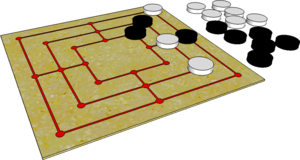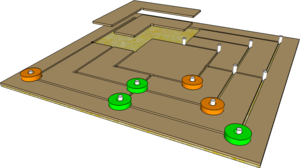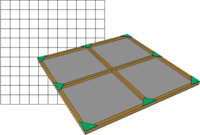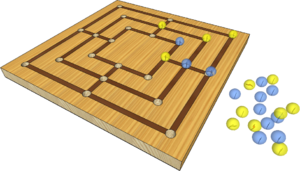Merels: Difference between revisions
From DT Online
mNo edit summary |
mNo edit summary |
||
| Line 58: | Line 58: | ||
[[Category:Primary]] | [[Category:Primary]] | ||
[[Category:Topics, Projects and Tasks]] | [[Category:Topics, Projects and Tasks]] | ||
[[Category: Tasks]] | |||
[[Category:Graphics and Modelling Tasks]] | [[Category:Graphics and Modelling Tasks]] | ||
[[Category:The Tudors]] | [[Category:The Tudors]] | ||
[[Category:Toys, Puzzles and Games]] | [[Category:Toys, Puzzles and Games]] | ||
Latest revision as of 19:12, 12 October 2017

Description
Merels , aka Merrels or Nine Men's Morris is a board game, with some similarites to Noughts and Crosses, which has been played since the time of Ancient Rome. Divers searching the wreck of the Mary Rose found a a Nine Men’s Morris board scratched into the end of a barrel, providing some evidence that it was still popular during the Tudor period.
Playing the Game
As with Noughts and Crosses, the game starts with an empty board and players take it in turn to place a playing piece at any vacant playing position. Once a player gets three pieces in a line (known as a Mill), they are able to remove any one of their opponent's pieces so each tries to stop the other achieving a Mill. The winner is the one who reduces their opponent to only two pieces, at which point they can no longer form a Mill.

Making the Game
Start with a square of card (e.g. 250mm square) or some other sheet material such as MDF. Draw the Merels board which, for Nine Mens Morris, is three squares one inside the other, with lines joining them together at the centre of their sides as shown. This arrangement produces 24 playable positions: 12 on the corners of each square and 12 where the centre lines cross the sides of the squares.

The lines and squares can simply be drawn using a felt-tip pen or you could draw the board layout using the computer, print it out on paper or thin card, and then Laminate this using either an Office Laminator or cover with self-adhesive transparent film - aka 'Sticky Back Plastic'.
Note:
Alternatively, they can be created by cutting shapes from thick card and arranging them on a base such that there is a small gap between each piece as shown.
The Playing Pieces
You will need 9 - 12 light coloured pieces and 9 - 12 dark pieces of approximately the same size.
The pieces should have a simple flat-bottomed shape and could be made from clay, ‘found’ materials (e.g. beads or buttons), or commercially available Wood Draught & Backgammon Pieces can be used.
Alternatively, Playing Pieces can be sawn from lengths of 20mm square Softwood, 20mm diameter Dowel or plastics tubing using a Precision Mitre Saw. They can also be made out of MDF discs or washers which are located on short pegs at each playing position.
Further Work

If required, the game board can be stiffened with an underframe using Stripwood Technology techniques to join together strips of softwood using cardboard triangles.
Additionally, the Game Board can be made to fold in two by hinging it down the centre so that both it and the Playing Pieces can be fitted into a Storage Box.

If a large (e.g. 10mm diameter) Drill is available, the board can be made from MDF, Ply or solid timber for example (e.g. 10mm-20mm thick) , and marbles used as playing pieces, which are located in 10mm dia holes part drilled through the board. The board layout can be indicated by Veneering or Inlay with contrasting wood Veneers.









